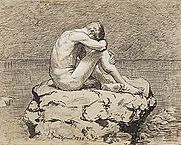Do you want to subscribe?
Subscribe today.
Cancel SubscribeWhen you open this pub again using this browser, you'll be returned to this page. When you move to the next page the bookmark will be moved to that page (if you move back the bookmark will remain on the furthest page to which you've read). By touching the bookmark you can set the bookmark to whichever page you are on.
More bookmark features coming soon.
You must login to publish and add your own notes. Eventually you will be able to see others contributions if they make them public.
More notes features coming soon.

"What do we call this time? It's not the information age: the collapse of popular education movements left a void filled by marketing and conspiracy theories. Like the stone age, iron age and space age, the digital age says plenty about our artefacts but little about society. The anthropocene, in which humans exert a major impact on the biosphere, fails to distinguish this century from the previous 20. What clear social change marks out our time from those that precede it? To me it's obvious. This is the Age of Loneliness." George Monbiot, the guardian
We have let our "technology" our economic systems determine our social realities. No longer does greater income create greater happiness. Rather, the opposite. We need to look at what the research says regarding human mental health, human needs for social interaction, and create societies that nurture this. How do we get off this treadmill and save our children?
"Three months ago we read that loneliness has become an epidemic among young adults. Now we learn that it is just as great an affliction of older people. A study by Independent Age shows that severe loneliness in England blights the lives of 700,000 men and 1.1m women over 50, and is rising with astonishing speed." says Monbiot. And Monbiot suggests "These structural changes have been accompanied by a life-denying ideology, which enforces and celebrates our social isolation. The war of every man against every man – competition and individualism, in other words – is the religion of our time, justified by a mythology of lone rangers, sole traders, self-starters, self-made men and women, going it alone. For the most social of creatures, who cannot prosper without love, there is no such thing as society, only heroic individualism. What counts is to win. The rest is collateral damage." What is going on with the way we live our lives that creates this epidemic, this insanity, or insanity causing social structure? Did we ask for it? Did anyone know this is what would result from our transition to the anthropocene?
"One of the tragic outcomes of loneliness is that people turn to their televisions for consolation: two-fifths of older people report that the one-eyed god is their principal company. This self-medication aggravates the disease. Research by economists at the University of Milan suggests that television helps to drive competitive aspiration. It strongly reinforces the income-happiness paradox: the fact that, as national incomes rise, happiness does not rise with them." continues Monbiot. TV is a drug that makes us passive. Legal drugs like alcohol dull the pain. Illegal drugs "help us cope" with a society gone mad, but where that is not achknowledged.
As we simply accept the treadmill we are placed upon nothing changes. The rich grow richer. Everyone else grows poorer. In what terms...monetory or human, and in what proportions? Who is driving this train wreck happening in slow motion? What can we, what must we do about it?
"The top 1% own 48% of global wealth, but even they aren’t happy. A survey by Boston College of people with an average net worth of $78m found that they too were assailed by anxiety, dissatisfaction and loneliness. Many of them reported feeling financially insecure: to reach safe ground, they believed, they would need, on average, about 25% more money. (And if they got it? They’d doubtless need another 25%). One respondent said he wouldn’t get there until he had $1bn in the bank." says to drill the point home. Happiness is just around the corner as we seek more, not knowing what is our purpose, what does it mean to be human.
What are the root causes? Will we the poor and disempowered find the will, the wisdom to overcome all that has been layered into our lives, that stifles our ability to see and make the needed changes? "For this, we have ripped the natural world apart, degraded our conditions of life, surrendered our freedoms and prospects of contentment to a compulsive, atomising, joyless hedonism, in which, having consumed all else, we start to prey upon ourselves. For this, we have destroyed the essence of humanity: our connectedness." When will we reconnect, in the real world, you and me, when will we meet face to face, hand-in-hand, embracing with love and respect, dignity in our true humanity.
What can you do about it according to George Monbiot? Check out his follow-up article "Seven ways to end loneliness".
Please read our Terms of Service which you agree to by using our services.
Please read our Terms of Service which you agree to by using our services.
Please read our Terms of Service which you agree to by using our services.